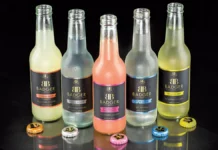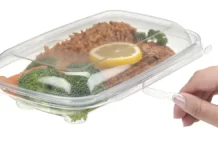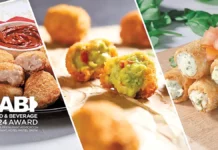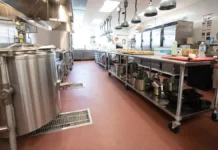
Stephen Yen, a French Culinary Institute (ICC) graduate, and a renowned restaurant chef, tells us how he overcame the often tricky transition from the restaurant to the club industry.
Liberty National is one of the finest golf properties in the country, with some incredible members. It is your second season; tell us how you overcame the transition challenges.
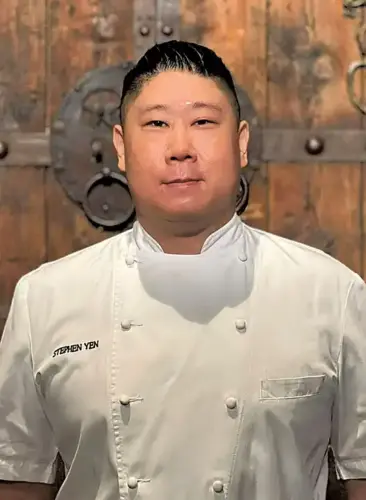
Transitioning from a restaurant to a golf or country club can be challenging. Although you may have regulars in a restaurant, for the most part, new people will dine each day or evening. In a typical restaurant, you can predict how much product you will need for the night, but in a club, it’s different.
One of my biggest hurdles was figuring out what the members wanted and preferred. It wasn’t just about having a menu and saying no to anything outside of it. We had to be accommodating and flexible, even if it meant sourcing ingredients, we don’t usually keep in stock.
Managing inventory and ensuring everything was fresh was challenging, but getting to know the members was even more critical. I had to engage with them to anticipate their needs, ask questions, and check in on their dining experiences. By doing so, I was able to build stronger relationships and provide better service.
In the first season, the challenge for me personally was that I was so used to the same ingredients, the exact measurements, and the same techniques. It was comfortable, but it also felt limiting. I grew to love cooking for the members at Liberty National. It’s all about being open to their input and feedback. They may have a favorite pasta sauce they want with a different type of pasta. Or they may have a special recipe they want me to try out. Whatever it is, I’m willing to listen and make adjustments. It’s a challenge, but it’s also gratifying.
Another learning curve is a lot of waiting, and then all of a sudden, all the golfers come in simultaneously. You might have zero reservations for dinner, and then suddenly, a member shows up with 12 guests, and you are making a last-minute wine dinner. You have to have the wines in-house, and you have to have the glasses polished.
Making use of downtime is critical and crucial. I’ve learned to make sauces, different rubs for different meats, and marinates, so we are ready to go. You don’t know when you’ll get flanked or attacked, but you must prepare the ammo. If you don’t, you will be dead in the water!
How did you build your team?
Building my team was challenging as I had transitioned from a restaurant to a club. I had already familiar staff, and then I had to hire restaurant staff who had to learn new skills to adapt to the new environment. Additionally, our location in Jersey City made it difficult for some potential employees to commute to work, as public transportation is limited.
During the interview process, I had to be careful not to ask illegal questions about transportation, which required me to use specific wording to ensure we remained legally compliant. One way we overcame this challenge is by utilizing carpooling. Despite these challenges, I am proud of the team we have built and the hard work they put in every day.
What are some of the drawbacks of working in a club setting?
Although working in a club setting is very rewarding, some drawbacks exist. For example, even if an employee loves the job, they may be laid off after just eight months due to seasonality, which can be a significant source of stress and uncertainty. This is especially true for cooks and dishwashers who may need more financial stability to fall back on.
How did you address this issue?
To address this issue, I hire part-time staff working in local Jersey restaurants to help ensure that everyone has enough work to keep them financially afloat. The right approach and mindset can also be a rewarding and fulfilling experience for everyone.
How do you keep the camaraderie in the kitchen, especially for a seasonal place?
Keeping camaraderie in the kitchen is crucial, especially in a seasonal place like Liberty National. I foster a team mentality by encouraging open communication, supporting each other, and celebrating small victories. We have regular team meetings to discuss challenges and successes and work together to find solutions. I also recognize exceptional work and show appreciation for my team’s efforts. By creating a positive and supportive environment, we can work together seamlessly and efficiently, even during the busiest times of the year.
What advice do you have for restaurant chefs wishing to make the transition? What are the positives and negatives?
My advice to restaurant chefs wishing to transition is to trail for more than a day; this holds for any role. When you first arrive, many changes will come to mind, but spend some time observing and implementing positive changes with everyone’s input.
Chefs might find that the line-level employees and the members could resist change. I recommend planting the seeds and letting them grow organically. If you come out swinging, the whole equilibrium of the kitchen will be disrupted. Listen to the employees about the members’ requests and how they enjoy particular food and beverages.
The positives of being a Club Chef would be: better hours; my last restaurant’s kitchen closed at 2 A.M. The negative would be the downtime, which isn’t a negative for everyone. I am just used to going 100 mph from working in NYC kitchens.
To learn more about Liberty National Golf Club and Chef Stephen Yen, visit their website.





















